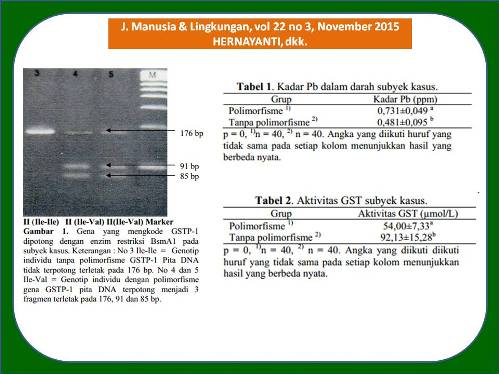
EFEK POLIMORFISME GENA GSTP-1 TERHADAP AKTIVITAS GLUTATION S-TRANSFERASE (GST) PADA INDIVIDU TERPAPAR LOGAM BERAT TIMBAL (Effect of GSTP-1 Gene Polymorphismson Glutation S- Transferase (GST) Activity in Heavy Metals Lead-Exposed Individual)
Hernayanti Hernayanti(1*), Agung Saprasetya Dwi Laksana(2), Saefuddin Aziz(3)
(1) Fakultas Biologi, Universitas Jenderal Soedirman, Jl. dr. Suparno 63, Purwokerto 53122.
(2) Fakultas Kedokteran, Universitas Jenderal Soedirman, Jl. dr. Gumbreg 1, Purwokerto 53146.
(3) Fakultas Biologi, Universitas Jenderal Soedirman, Jl. dr. Suparno 63, Purwokerto 53122.
(*) Corresponding Author
Abstract
ABSTRAK
Gena GSTP-1 merupakan penghasil enzim glutation S- transferase (GST), yang berfungsi dalam proses detoksifikasi senyawa toksik di hati. Faktor keberadaan polimorfisme gena GSTP-1 akan menyebabkan penurunan ekspresi GST, sehingga proses detoksifikasi terhadap senyawa toksik akan terhambat. Kerentanan terhadap paparan senyawa toksik pada manusia akan meningkat apabila dijumpai polimorfisme gena. Salah satu senyawa toksik yang dapat menghambat aktivitas GST adalah timbal (Pb), terutama dalam bentuk tetra ethyl lead (TEL). Tujuan penelitian adalah untuk mengetahui pengaruh polimorfisme gena GSTP-1 terhadap aktivitas GST pada individu terpapar Pb, yang diwakili pekerja bengkel mobil. Faktor keberadaan polimorfisme gena individu ditentukan dengan metode PCR-RFLP dan enzim restriksi BsmA1. Parameter yang diukur adalah kadar Pb dan aktivitas GST. Analisis molekuler gena GSTP-1 dilakukan secara deskriptif. Data kadar Pb dan aktivitas GST dianalisis dengan uji t independent. Hasil analisis gena GSTP-1 dari 40 orang subyek kasus setelah dilakukan digesti dengan enzim BsmA1, ditemukan sebanyak 10 orang individu dengan polimorfisme Ile105Val gena GSTP 1 atau sekitar 25% dengan genotip Ile-Val, sedangkan 30 orang atau 75% ditemukan tanpa polimorfisme dengan genotip Ile-Ile. Pita DNA individu dengan polimorfisme terpotong menjadi 3 fragmen sepanjang 176, 91 dan 85 pp (mutan heterozygot), sedangkan tanpa polimorfisme terletak pada 176 bp. Subyek kasus dengan polimorfisme gena GSTP-1 memiliki kadar Pb lebih tinggi dan aktivitas GST lebih rendah dibandingkan individu non polimorfisme. Telah terbukti bahwa polimorfisme gena GSTP-1 menyebabkan penurunan ekspresi enzim GST. Pada individu terpapar Pb dengan polimorfisme gena GSTP-1 memiliki aktivitas GST lebih rendah dibandingkan individu tanpa polimorfisme.
ABSTRACT
GSTP-1 gene regulates the expression of gluthation S-transferase enzyme, which role in detoxification of toxicant on liver. If the polymorphisms gene is found in individual, the production of GST is decreased and the enzyme failed to eliminate toxicants. Lead is one of toxic agents that could inhibite GST activity especially tetra ethyl lead (TEL). The susceptibility to lead exposure will increase if the polymorphisms gene is found in population. The objective of this studies were to know the effect of gene GSTP-1 polymorphisms to GST activity on lead-exposed individual ie. autorepair workers. The genotype individu were analyzed by Polymerase Chain Reaction (PCR)-Restriction Fragment Length Polymorphisms with BsmA1 restriction enzyme followed by descriptived analyzed. Parameter recorded were blood lead and GST activity and data were analyzed by independent t-test. These result showed that 25% of 40 individual cases subject were detected by enzyme BsmA1 as polymorphisms individual of GSTP-1 gene, with Ile105Val genotype. As many as 75% were detected as non polymorphisms with Ile-Ile genotype. Three fragment DNA of polymorphisms individual of GSTP-1 is located on 176, 91 and 85 bp (heterozygote mutant) but non polymorphisms individual is only located on 176 bp. The Pb level of individual with polymorphisms GSTP-1 gene is higher than non polymorphisms individual but their GST activity was lower than non polymorphisms individual. It could be concluded that polymorphisms GSTP-1 gene could decrease the expression gene of GST enzyme and intoxication of lead-exposured could increased the decreasing of this activity.
Keywords
References
Anonim, 2000. Threshold Limited Value and Detection Method for Chemical Substances and Biological Exposure Indices. OSHA, Cincinatti.
Anonim, 2002. Glutathion S-Transferase Activity Manual Assay Kit. Biovision Research Product, 980:1-3.
Buchard, A., Juan J. S., Dalhoff,K dan Morling, N, 2007. Multiplex PCR Detection of GSTM1, GSTT1 and GSTP1 Gene Variations. Journal of Molecular Diagnostics, 9(5):612-617.
Chen, Y.L., Tseng, H.S., Kuo, W.H., Yang, S.F., Chen, D.R dan Tsai, H.T. 2010. Gluthation S-transferase P1 (GSTP1) Gene Polymorphism Increase Age-Related Susceptibility to Hepatocellular Carcinoma. BMC Medical Genetics, 11(46):1-8.
Chuang, H.J.,Yu, K.T., Ho, C.K., Wu, M.T., Lin, G.T., dan Wu, T.N., 2004. Investigation of Vitamin D Receptor Polymorphism Affecting Workers’ Susceptibility to Lead. J. Occup. Health, 46:316-321.
Eshkoor, S.A., Ismail, P., Rahman, S.A dan Moin, S., 2011. Does GSTP1 Polymorphism Contribute to Genetic Damage Caused by Ageing and Occupational Exposure? Arh. Hig. Rada Toksikol., 62:291-298.
Hernayanti, Sukarti, M., Sadewa A.H., Hariono, B., dan Wahyuono, S., 2012. Efek Polimorfisme Gena Nitrit Oksida Sintase3 (NOS3) terhadap Kadar Nitrit Oksida dan Tekanan Darah pada Individu Terpapar Plumbum. Jurnal Manusia dan Lingkungan,19(2):160-168.
Khansakorn, N., Wongwit,W., Tharnpophasiam, H., Hengprasith, B., Suwannathon, L., Chanpraserttyothin, S., Kaojarern, S., Sritara, P dan Srivarasal, J. 2011. Genetic Variations of Glutathione S-transferase Influence on Blood Cadmium Concentration. Journal of Toxicology, 11:1-6.
Konwar, R., Manchanda P.K., Chaudharydan Nayak, V.L. 2010. Glutathion S- Transferase (GST) Gene Variats and Risk of Benign Prostatic Hyperplasia : A Report in A North Indian Population. Asian. J. Cancer Prev., 11:1067-1072.
Palar, H., 2008. Pencemaran dan Toksikologi Logam Berat. P.T Rineka Cipta, Jakarta.
Patrick, L.N.D., 2006. Lead Toxicity Part II : The Role of Free Radical Damage and The Use of Antioxidants in The Pathology and Treatment of Lead Toxicity. Alternative Medical Review, 10(4):114-117.
Ping, J., Wang, H., Huang M., dan Liu, Z.S., 2006. Genetic Analysis of Gluthation S- TransferaseA1 Polymorphism in The Chinese Populations and The Influence of Genotype on Enzymatic Properties. Toxicol. Sci., 89(2):438-443.
Vitayavirasuk, B., Junhom, S., dan Saeranee, P.T., 2005. Exposure to Lead, Cadmium and Chromium Among Spray Painters in Automobile Body Repair Shops. J. Occup. Health, 47:56-60.
Wahyuningsih, Yunus, Ikhsan dan Wijaya, 2003. Dampak Inhalasi Cat Semprot Terhadap Kesehatan Paru. Cermin Dunia Kedokteran, 2:1-7.
Article Metrics
Refbacks
- There are currently no refbacks.
Copyright (c) 2017 Jurnal Manusia dan Lingkungan







